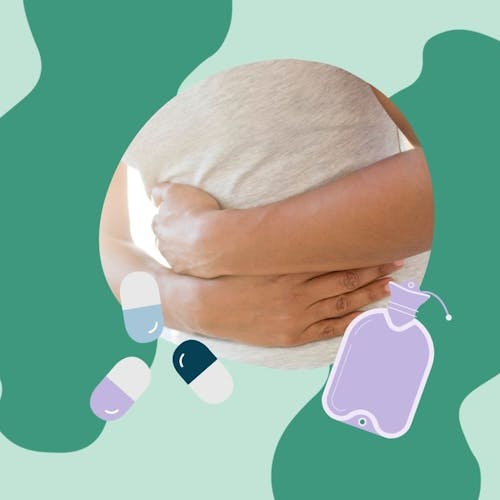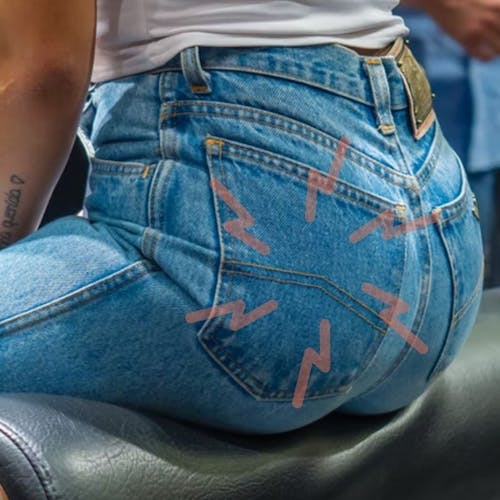This website uses cookies to enhance the user experience. By using Yoppie you are agreeing to our use of cookies.
Period Bloating: What's Going On?
Written by Yoppie
19 Feb 2021
What is bloating? Like, what’s actually in there?
How does bloating feel?
What causes bloating?
When does bloating happen?
How to minimise and manage bloating
If you suffer from period bloating, we 100% feel you. Really, we do. The swollen belly, the constant expelling of air from every orifice, the impossible task of getting off the sofa… it’s all pretty common at certain times during your cycle. But what’s actually going on in there? We’re doing a deep dive on all things bloating; the cause, the feels, the ways to reduce it. Let’s go...
What is bloating? Like, what’s actually in there?
One thing people commonly mix up is the difference between bloating and water retention. They are often used interchangeably, but are in fact two separate things that can both happen in the week before your period. Premenstrual water retention is typically caused by hormone fluctuations, and diet can also play a role. Bloating of the period variety can be caused by hormones, but it presents as a gaseous feeling of increased pressure in the abdomen, even if there isn’t actually anything in there.
How does bloating feel?
Abdominal bloating can feel like your belly is full, or even swollen. It can feel tight, hard to the touch, and can be rather painful. You might also pass wind more than usual, frequently burp, or experience belly gurgles. For some people this will quickly pass and it won’t be an issue, while for others, it can interfere with daily life and cause them to avoid social situations. If this is the case for you, you should speak to your GP about it so they can provide possible remedies.
What causes bloating?
Bloating happens when your hormone levels change before your period begins, specifically the hormones progesterone and oestrogen. These changes can also cause the body to retain more water and salt, which adds to the feeling of bloating. According to one study, 85% of people report physical symptoms related to their period. This could be cramping, acne, fatigue and others, but it also includes bloating. Symptoms can change month to month and as you get older, so don’t worry that you’ll be bloated every month until the end of time - the bloat may disappear as quickly as it appeared!
When does bloating happen?
Most people who menstruate can experience bloating one or two days before their period begins. For some, it starts as much as five days before, and can affect everyday activities. One study done in 2011 found that people whose bodies retained the most water experienced worse bloating on the first day of their period. Once you start your period, bloating tends to dissipate and you may find some relief.
How to minimise and manage bloating
Period bloating isn’t a nice feeling, so even if you know it’s going to disappear after your period comes, you may want to try a few tricks to lessen the impact. While you can’t always prevent bloating completely, there are some home remedies that can help:
- Try reducing the sodium in your diet and limit processed foods: Anything with too much salt can cause bloating, and processed foods tend to have more of it. Try to incorporate healthier foods into your diet to ease the bloat monster, such as fruit, vegetables, whole grains, nuts, seeds, and more.
- Drink lots of water: Getting enough hydration is always good for you, but more than ever on the days leading up to your period. By making sure you always have a full water bottle handy, you’re more likely to remember to drink plenty of fluids, and this can help alleviate bloating. There are different guides out there telling you how much water to drink each day, but sticking to 2 or 3 bottles will usually do the trick.
- Avoid caffeine and alcohol: It is well known that alcohol and caffeine can contribute to bloating and other PMS symptoms, so limiting these or switching to water in the week leading up to your period can do wonders.
- Do some gentle exercise: It’s the last thing we want to do when suffering from PMS and bloating, but light exercise could make you feel better in the long run. A brisk walk or a short yoga session can really help.
- Try supplements: PMS symptoms like fatigue may also be the result of nutritional deficiencies. Supplements like calcium, vitamin D, Vitex agnus-castus or Ginko biloba are suggested by the RCOG to help those struggling with these symptoms. Our Hormone Hero supplement is specifically designed to target the bloated, tired feeling that comes before your period. The 12 key, natural ingredients work to support the hormonal symptoms of PMS, including activated charcoal which contributes to the reduction of excessive intestinal gas accumulation.
- If your bloating is particularly bad, you may wish to speak to your GP, who can help look into other causes, and guide you about other available treatment options.
Do you experience bad bloating around your period? We’d love to know how you manage it. Share in our private Facebook group or drop us a note on Insta @itsyoppie. Don't forget that our personalised period subscription box can get organic tampons (and much more, including bloating supplements!) delivered easily and regularly through your letterbox, which is one less worry to weigh you down.
Fact checked by Doctor Samantha Miller.
References
Yonkers KA, O’Brien PMS, Eriksson E. Premenstrual syndrome. Lancet (London, England) 2008; 371: 1200–1210.
Tschudin S, Bertea PC, Zemp E. Prevalence and predictors of premenstrual syndrome and premenstrual dysphoric disorder in a population-based sample. Arch Womens Ment Health 2010; 13: 485–494.
White CP, Hitchcock CL, Vigna YM, et al. Fluid Retention over the Menstrual Cycle: 1-Year Data from the Prospective Ovulation Cohort. Obstet Gynecol Int 2011; 2011: 1–7.
Royal College of Obstetricians and Gynaecologists. Patient information leaflet: Managing Premenstrual Syndrome. RCOG 2018; 21: 1–5.
Section jump
Back to top
Subscribe To Our Newsletter
YOPPIE





© 2026 Yoppie is a registered trademark of Phlo Technologies Ltd.
Yoppie's supplements are not a substitute for a varied diet and healthy lifestyle and are not intended to diagnose, treat, or cure any disease. If you are pregnant, breastfeeding, have a medical condition or are under medical supervision, please consult with your doctor before taking any of our products.






